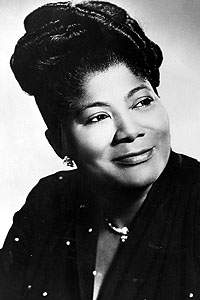 Mahala “Halie” Jackson was born on October 26, 1911, in New Orleans, Louisiana. Jackson loved to sing, especially in church, and that is where her singing career began – at the local Mount Moriah Baptist Church.
Mahala “Halie” Jackson was born on October 26, 1911, in New Orleans, Louisiana. Jackson loved to sing, especially in church, and that is where her singing career began – at the local Mount Moriah Baptist Church.
In 1927, at the age of 16, Jackson moved to Chicago, Illinois, during the Great Migration. After her first Sunday school service, where she had given an impromptu performance of her favorite song, "Hand Me Down My Silver Trumpet, Gabriel", she was invited to join the Greater Salem Baptist Church Choir. She began touring with the Johnson Gospel Singers, one of the earliest professional gospel groups.
She refused to sing secular music, a pledge she would keep throughout her professional life although she was frequently offered money to do so. She even divorced her first husband because of his unrelenting pressure on her to sing worldly music.
"I sing God's music because it makes me feel free", Jackson once said about her choice of gospel, adding, "It gives me hope. With the blues, when you finish, you still have the blues."
In 1948, Jackson recorded the William Herbert Brewster song "Move On Up a Little Higher", a recording so popular stores could not stock enough copies to meet demand. The success of this record rocketed her to fame in the U.S., and soon after, in Europe. During this time, she toured as a concert artist, appearing more frequently in concert halls and less often in churches. Because of this change in her venues, her arrangements expanded from piano and organ to orchestral accompaniments.
In 1950, Jackson became the first gospel singer to perform at Carnegie Hall. She started touring Europe in 1952 and was hailed by critics as the "world's greatest gospel singer." With her mainstream success, Jackson was criticized by some gospel purists who complained about her hand-clapping and foot-stomping and about her bringing jazz into the church. But that didn’t stop Jackson, she went on to have many noticeable accomplishments, such as singing for at John F. Kennedy's inaugural ball, singing at the March on Washington, and singing at the funeral of Martin Luther King Jr.
Jackson played an important role during the civil rights movement. She was contacted by Martin Luther King Jr and Ralph Abernathy about singing at a rally in Montgomery to raise funds for the bus boycott. Despite death threats, Jackson agreed to sing. There was a good turnout at the concert and they were happy with the amount of money raised. However, when they returned to the Abernathy's home, it had been bombed. Jackson said that she hoped her music could "break down some of the hate and fear that divide the white and black people in this country.”
Jackson devoted much of her time and energy to helping others. She established the Mahalia Jackson Scholarship Foundation for young people who wanted to attend college. For her efforts in helping international understanding, she received the Silver Dove Award. Jackson was described by Harry Belafonte as "the single most powerful black woman in the United States," and anyone who can claim that title deserves recognition to me.
No comments:
Post a Comment